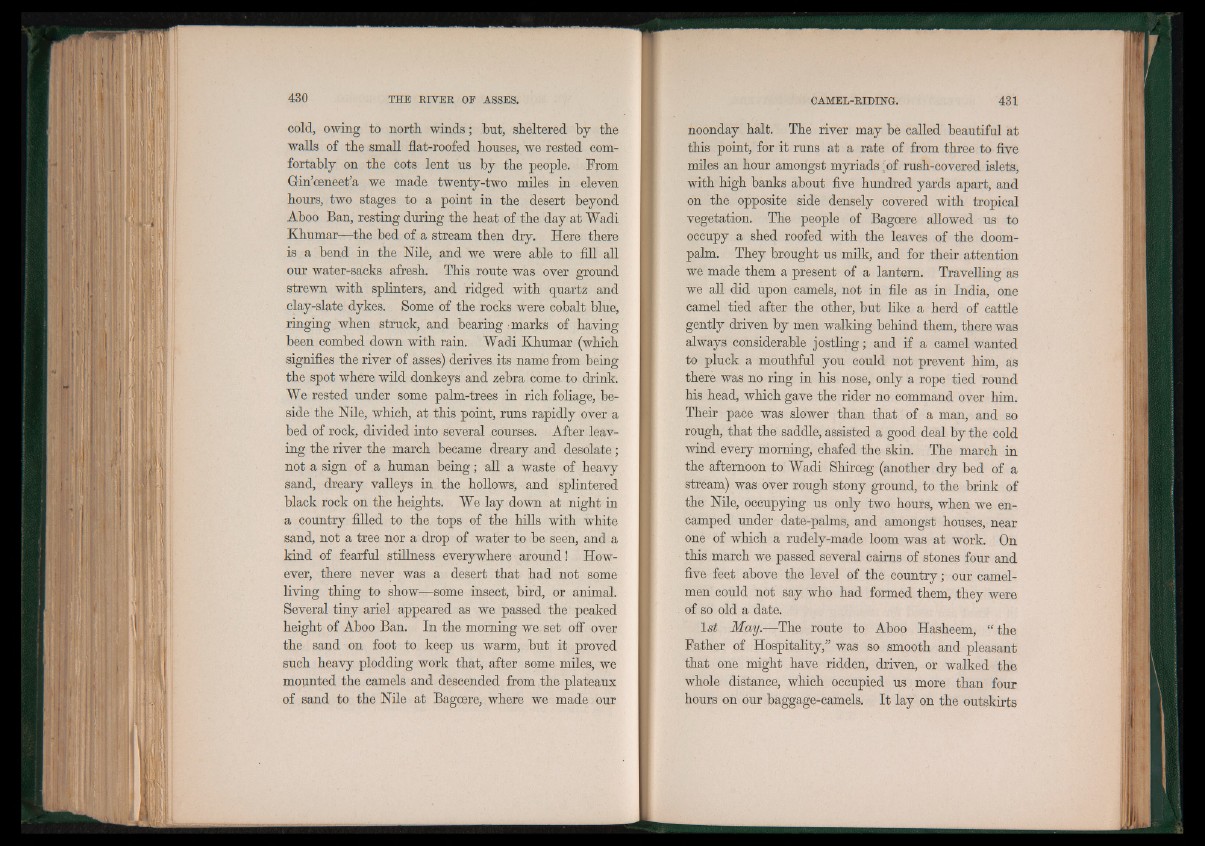
cold, owing to north winds; but, sheltered by the
walls of the small flat-roofed houses, we rested comfortably
on the cots lent us by the people. From
Gin’oeneet’a we made twenty-two miles in eleven
hours, two stages to a point in the desert beyond
Aboo Ban, resting during the heat of the day at Wadi
Khumar—the bed of a stream then dry. Here there
is a bend in the Nile, and we were able to fill all
our water-sacks afresh. This route was over ground
strewn with splinters, and ridged with quartz and
clay-slate dykes. Some of the rocks were cobalt blue,
ringing when struck, and bearing marks of having
been combed down with rain. Wadi Khumar (which
signifies the river of asses) derives its name from being
the spot where wild donkeys and zebra come to drink.
We rested under some palm-trees in rich foliage, beside
the Nile, which, at this point, runs rapidly over a
bed of rock, divided into several courses. After leaving
the river the march became dreary and desolate;
not a sign of a human being; all a waste of heavy
sand, dreary valleys in the hollows, and splintered
black rock on the heights. We lay down at night in
a country filled to the tops of the hills with white
sand, not a tree nor a drop of water to be seen, and a
kind of fearful stillness everywhere around! However,
there never was a desert that had not some
living thing to show—some insect, bird, or animal.
Several tiny ariel appeared as we passed the peaked
height of Aboo Ban. In the morning we set off over
the sand on foot to keep us warm, but it proved
such heavy plodding work that, after some miles, we
mounted the camels and descended from the plateaux
of sand to the Nile at Bagoere, where we made our
noonday halt. The river may be called beautiful at
this point, for it runs at a rate of from three to five
miles an hour amongst myriads; of rush-covered islets,
with high banks about five hundred yards apart, and
on the opposite side densely covered with tropical
vegetation. The people of Bagoere allowed us to
occupy a shed roofed with the leaves of the doom-
palm. They brought us milk, and for their attention
we made them a present of a lantern. Travelling as
we all did upon camels, not in file as in India, one
camel tied after the other, but like a herd of cattle
gently driven by men walking behind them, there was
always considerable jostling; and if a camel wanted
to pluck a mouthful you could not prevent him, as
there was no ring in his nose, only a rope tied round
his head, which gave the rider no command over him
Their pace was slower than that of a man, and so
rough, that the saddle, assisted a good deal by the cold
wind every morning, chafed the skin. The march in
the afternoon to Wadi Shiroeg (another dry bed of a
stream) was over rough stony ground, to the brink of
the Nile, occupying us only two hours, when we encamped
under date-palms, and amongst houses, near
one of which a rudely-made loom was at work. On
this march we passed several cairns of stones four and
five feet above the level of the country; our camel-
men could not say who had formed them, they were
of so old a date.
lsi May.—The route to Aboo Hasheem, “ the
Father of Hospitality,” was so smooth and pleasant
that one might have ridden, driven, or walked the
whole distance, which occupied us more than four
hours on our baggage-camels. It lay on the outskirts